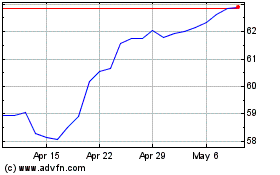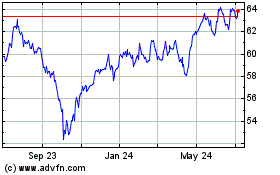By Mike Esterl
The U.S. soda industry faces its biggest threat yet in
Philadelphia, which is weighing a tax that could raise the price of
a can of Coke or Pepsi by more than half and sharply curb
consumption of sugary drinks.
Jim Kenney, who is mayor of Philadelphia, the country's
fifth-largest city, is pitching the budget measure to pay for
prekindergarten and other popular services.
That is a shift in strategy from other municipalities like El
Monte, Calif., and Telluride, Colo., that have lost taxation bids
after playing up the health benefits of scaling back on sweetened
beverages.
Philadelphia's proposed levy of 3 cents an ounce is three times
higher than in Berkeley, Calif., the first U.S. city to pass such a
measure. Philadelphia's city council plans to vote in June on the
tax, which would cover regular soda and other sugar-added beverages
including sports and energy drinks and ice tea.
The American Beverage Association, funded by Coca-Cola Co.,
PepsiCo Inc. and Dr Pepper Snapple Group Inc., has spent more than
$3 million on television and radio ads opposing the measure. A
large coalition including local retailers, restaurants and the
International Brotherhood of Teamsters oppose the tax, warning
grocery bills would soar, jeopardizing thousands of jobs and
hitting the poor the hardest.
Even without the taxes, soda drinkers are peeling off amid
concerns over rising obesity and diabetes rates. U.S. soda volumes
dropped 1.2% in 2015, the 11th straight yearly decline, and
per-capita consumption is at a three-decade low, according to
industry tracker Beverage Digest.
"The answer is not regressive taxes. The answer is, for sure,
collaborative innovation," said Coke Chief Executive Muhtar Kent at
the company's shareholder meeting last month, referring to soda
taxes in general. He cited industry efforts to introduce smaller
package sizes and lower-calorie drinks.
Yet elsewhere in the country, Oakland's city council voted this
month to put a penny-per-ounce tax on the November ballot. In San
Francisco and Boulder, Colo., residents have been collecting
signatures for a similar measure. Baltimore's city council is
considering store signs warning that sugary drinks fuel obesity,
diabetes and tooth decay. San Francisco will start enforcing a law
requiring a similar warning on billboards and other public
advertisements in July.
Mr. Kenney, Philadelphia's mayor since January, has steered
clear of health arguments for sugary-drink taxes, instead selling
his measure as an efficient way to generate nearly $100 million in
annual revenue to fund thousands of pre-K slots, new schools,
libraries, parks and recreation centers.
"I sense Americans generally and I know Philadelphians don't
like the government telling them what they should and should not
do," he said in an interview.
About 59% of Philadelphians backed the sugary drink tax in a
poll by Temple University's Institute for Survey Research published
earlier this month. The city's largest newspaper, the Philadelphia
Inquirer, also has endorsed the proposal. Residents voted
overwhelmingly last year to create a commission to pursue universal
pre-K.
In his March budget speech, Mr. Kenney said he proposed the tax
after a young inmate told him the education program at a local jail
was "the best school" he had ever attended. "There is simply
nowhere else to find this revenue," added Mr. Kenney, noting
Philadelphia already has raised property taxes four times in the
past five years.
But everyone agrees the hefty tax would alter behavior. The
beverage industry estimates Philadelphia's consumption would fall
by 79% in the first year and the mayor's office estimates a 55%
drop. The average Philadelphian consumes about 14 ounces of
sugar-added drinks a day, similar to national estimates. In Mexico,
which introduced a sugary drink tax in 2014, soda sales volumes are
rising again after initially falling. But the more modest levy only
increased prices by about 10%.
A 3-cent-per-ounce tax would raise prices by 55% to 60% on
average if fully passed to consumers, according to city and
industry estimates. Popular discounted packages of soda at
supermarkets such as 2-liter bottles and 12-packs of 12-ounce cans,
which often retail for about $2 and $4, respectively, could double
in price. Free refills at restaurants and movie theaters also could
disappear.
Passage of the tax is far from certain. Three of 17 city council
members have publicly opposed the measure and several have voiced
concerns, including President Darrell Clarke, who has said the tax
likely would have to be lowered to win enough support. Councilwoman
Blondell Reynolds Brown proposed Thursday an alternative flat tax
of 15 cents on most beverage containers. The beverage industry also
hasn't ruled out suing to try to stop the levy.
Opponents, including concerned retailers, predict consumers will
drive to neighboring counties for soda. A hefty tax would "turn
Philadelphia into probably one of the biggest black market cities
in the U.S.," predicted Harold Honickman, chairman of Honickman
Group, which distributes Canada Dry and Snapple in the city.
The soda industry has spent more than $100 million since 2009 to
defeat taxes in more than two dozen cities and states, partly by
arguing they smack of a "nanny state." Philadelphia abandoned a
proposal in 2011 after the industry contributed $10 million to a
local children's hospital.
Meanwhile, money is pouring in from the outside. Michael
Bloomberg, who tried unsuccessfully to cap portion sizes as New
York mayor, has contributed hundreds of thousands of dollars to the
local "yes" coalition. The coalition, Philadelphians For A Fair
Future, is airing TV ads arguing the tax would "help lift our
children" out of poverty.
Philadelphians Against the Grocery Tax Coalition, funded by the
beverage industry, is airing an ad showing paper dolls falling to
the ground and a voice-over warning there won't be enough money for
pre-K if sales plunge. The group said it delivered more than 25,000
letters and petitions opposing the tax to city council members
Thursday, and a protest rally earlier this month drew hundreds,
many wearing "no soda tax" T-shirts, as Teamster drivers circled in
Coca-Cola and Canada Dry trucks and honked.
Write to Mike Esterl at mike.esterl@wsj.com
(END) Dow Jones Newswires
May 19, 2016 15:21 ET (19:21 GMT)
Copyright (c) 2016 Dow Jones & Company, Inc.
Coca Cola (NYSE:KO)
Historical Stock Chart
From Mar 2024 to Apr 2024

Coca Cola (NYSE:KO)
Historical Stock Chart
From Apr 2023 to Apr 2024
